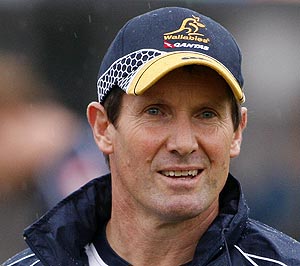
There is genuine dismay among players in the 26-29 years age bracket that their hard-won experience might now actually be working against them, that at any moment they could forfeit their position to the newest bright young thing.
Professional athletes are notoriously insecure at the best of times and within the current Wallabies that unease is magnified by the fact that the four-year rugby cycle has worked its way around to another World Cup.
But even making allowances for these individual anxieties, there is something else at work here, something wider, a fear that a vital element of the Wallabies’ culture will be lost.
The elders in the Australia side have always been the guardians of the flame, the setters of standards, the hugely respected role models for the younger players coming in.
In no other rugby playing country has experience been more prized. Of the 18 players in history who have earned 100 Test caps, Australia has the most centurions – George Gregan, George Smith, Steve Larkham and David Campese. Of the all-time top 50 cap-earners, nine are Australians; of the top 100, a record 16 are Australians.
By contrast, only seven players from South Africa and nine from New Zealand figure in the top 100 list.
There is a reason for this, of course. Australia’s playing numbers have always been modest compared to the other rugby heavyweights.
Where other nations might have had the luxury of depth of talent to be able to jettison quality players temporarily out of form, Australia has tended to respect the ability of its best players to ride out form slumps.
That player longevity has been one of the key factors behind Australia’s success in the professional era. Of all the major teams in world rugby, the Wallabies have most benefited from the game’s transition in 1996 from amateurism to professionalism.
During the amateur era, the Wallabies’ Test success rate was 44.5 per cent. Five other countries, New Zealand (71.2), South Africa (63.9), France and Wales (52.7) and England (50.3) had higher winning percentages.
But since 1996, the period in which all of those 16 Australians mentioned above, save for Michael Lynagh and Campese, earned the bulk of their caps, Australia’s win rate has leapt to 63.6 per cent, the biggest jump of any team.
The five countries that have contributed most players to the top 100 most-capped list rank among the six biggest improvers from the amateur age to the professional.
No doubt other factors are at work in other countries, but the correlation between experience and success is irrefutable where the Wallabies are concerned.
Suddenly, however, Robbie Deans is taking another path entirely, pinning his hopes almost entirely on youth, with half the side that played in the final Test of the spring tour aged 22 or younger.
Granted, there can be no arguing with the fact that they did the job spectacularly, blitzing a strangely dispirited France with five late tries to win 59-16, but until the 47-minute mark of that bizarre Test, the lead paragraphs of match reports all would have focused on the fact that Australia’s scrum had capitulated again.
It may be that Deans is on the right track with the current player group he has at his disposal. At the risk of seeming to contradict myself, I believe he is steering a course that could well take the Wallabies to the World Cup final.
But he needs to beware. He is running the risk of losing his older and middle-aged players by constantly coming down in favour of youth.
Losing them in terms of morale in the first instance, but losing them in a physical sense as well, with just about every player in the side over the age of 26 giving serious thought to taking a European contract.
None will speak out publicly and who can blame them in a World Cup year? But there is widespread dismay at how Matt Giteau, who has given Australia solid service over a decade and 91 Tests, has been treated. After being told he had to rediscover his mojo, Giteau was dumped to the bench for the Italy Test.
Every senior player recognised the significance of Giteau not playing that match. He has made no secret of the fact that this will be his last year of Test rugby. When he didn’t play against Italy, it all but ended his dream of reaching 100 Tests.
No one is owed anything, of course, but equally there is no need to snub Australia’s most experienced back. Small wonder Giteau didn’t even bother to contact the Australian Rugby Union before making up his mind to go to France at the end of 2011.
And yet, of all the many Wallabies I have spoken to in recent days, there is not a single player who believes Giteau’s value to the Australia side is at an end. Even if they did believe that, they still don’t like what they’re seeing.
As one senior Wallabies player put it: “It’s good for an organisation to show respect for blokes who give good service … it promotes a culture of long service. And it’s important to preserve that culture.”
It’s a culture that is being lost. The young generation of whiz-kids is enjoying instant gratification. But how long can that last?
And then what?
by Buford Balony

